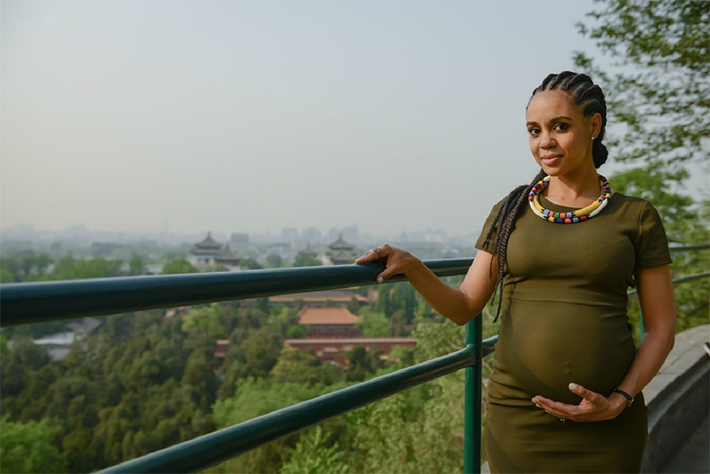|
||||||||||
| Home Top News Economy/Tech Culture/Sports China in Foreign Eyes Green Development Videos Intangible Cultural Heritages |
|
||||||||||
| Home Top News Economy/Tech Culture/Sports China in Foreign Eyes Green Development Videos Intangible Cultural Heritages |
| ChinAfrica |
| It's a Boy! |
| Giving birth in China has its moments |
| By Hannah Ryder | VOL.10 October ·2018-10-19 |

Hannah Ryder (COURTESY PHOTO)
When I found out I was pregnant, the first thing on my mind was not how I was going to actually deliver my child. But it probably should have been.
After 10 years of being married, my husband and I were definitely ready to have a child, but we were still worried about whether we would really have the time and money to bring up a child. And for me, the pregnancy process itself seemed daunting - how would I change? Would I ever go back to "normal?"
These were important questions, but living here in China - a country still defined as a developing country despite the skyscrapers - the delivery itself should have occupied my mind too.
According to the UN, in 2015, around the world, 303,500 women died during childbirth and 2.7 million babies died within the first month of their life. A total of 99 percent of these women live in developing countries. Thankfully for me and my son-to-be, China was amongst the safest for delivery. In the same year, according to the World Health Organization statistics, for every 100,000 births, 27 women passed away in China. The majority of women in China are able to deliver in a hospital, although there are large inequities. There are certain rural areas - especially in west and central China - which have much higher rates of death from childbirth. Chinese women who are migrants to large cities also suffer disproportionately due to their lack of access to insurance and other maternal health entitlements.
I was lucky not to be one of these women. As a foreigner living in China myself, my work at the UN at the time had covered me for maternity insurance, meaning I had access to some top private international hospitals and VIP sections at public hospitals in Beijing for the delivery - access worth over $6,000. I even explored the possibility of having a water birth but found out that the only hospital in Beijing that offers this was a fairly small private hospital in the south, several km away from my home and I was worried about complications if I had to sit in Beijing's traffic.
So, I continued to visit the larger international hospital that my insurance provider recommended, and got more and more excited as the due date neared. Little was I to know that there was another challenge I should have prepared myself better for.
For maternal health, China is known around the world because of its high rate of caesarean or c-sections. C-sections are not dangerous in themselves, but there is evidence to suggest they are associated with childhood obesity, postpartum depression, and other problems. In 2010, a study by the UN suggested that almost half of all births in China were by c-section, compared to around 18 percent around the world. There are other developing countries where c-section rates are high - for instance Brazil and Egypt, but the issue here is the volume - in China that's around 8 million babies delivered by c-section.
As a result, in recent years, the Chinese Government has put in place several policies and programs to try to bring the rates down. Statistics from China's health authority show that China's c-section rate has dropped to 35 percent. Nevertheless, I ended up being one of those 35 percent. My doctors had expected a normal delivery - my baby was not in a breach position and there were no other abnormal signs. But in the end after a painful 12 hours of labor, all the water surrounding my baby had drained out of me and he was unable to get out easily. So he started to suffer and the doctors rushed me to the emergency room. I requested for the doctors to allow my husband to be with me as the doctors delivered the boy, and as soon as we both heard him cry we were relieved and happy beyond words.
Today we are lucky to have a healthy amazing son who is learning to speak Chinese fluently as we bring him up here… but that's another story for another day.
(The writer is a Kenyan-British diplomat, economist and writer living in Beijing)
(Comments to niyanshuo@chinafrica.cn)
| About Us | Contact Us | Advertise with Us | Subscribe |
| Copyright Beijing Review All rights reserved 京ICP备08005356号-5 京公网安备110102005860号 |